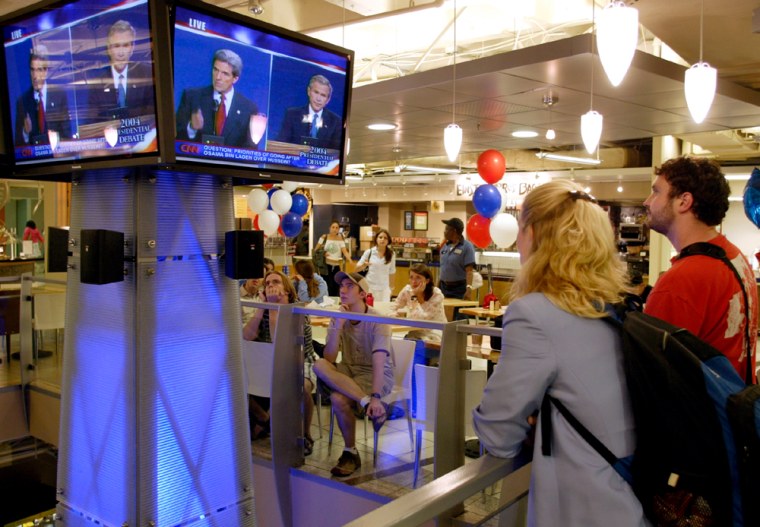President Bush and his Democratic challenger John Kerry engaged in pitched battle Thursday night in their 90-minute face-off, a battle mostly about the past — how the United States got embroiled in Iraq.
The battle was less about the future — how the United States can get out of its involvement in Iraq.
The two rivals argued over the bedeviling question that has divided the nation since Congress, including Kerry, voted to authorize Bush to unleash U.S. military forces on Saddam Hussein’s Iraq.
There was no one melodramatic, heart-stopping moment; no rhetorical catastrophe struck either man.
The consistent message from Kerry was essentially this: Bush has made "a colossal error of judgment" in Iraq. Elect me and I’ll build alliances that will help us get U.S. troops out of Iraq.
The message from Bush can be summed up in the phrase he used at least a dozen times: “mixed message” — that Kerry has adopted different positions on Iraq, revealing a fickleness that makes him unsuitable as commander in chief.
Kerry was on the defensive for at least part of the debate, because he was required to consume precious time explaining why he voted to give Bush the authority to go to war — a war that at least since March of 2003 he has said was not necessary.
“I wasn't misleading when I said he (Saddam Hussein) was a threat,” Kerry explained at one point. “Nor was I misleading on the day that the president decided to go to war when I said that he (Bush) had made a mistake in not building strong alliances and that I would have preferred that he did more diplomacy.”
Kerry insisted, “I've had one position, one consistent position, that Saddam Hussein was a threat. There was a right way to disarm him and a wrong way. And the president chose the wrong way.”
The core of Kerry’s Iraq argument — and perhaps it’s not too much to say the core of Kerry’s chances of winning the presidency on Nov. 2 — is the question of getting foreign governments to help in Iraq.
The question hinges on whether a majority of voters do conclude that Kerry could get other nations to help. He is essentially asking voters to take a leap of faith that he'd be able to bring allies into the Iraq operation.
Bush did not put Kerry on the spot by forcing him to say which nations would be willing to contribute troops to Iraq pacification, since France and Germany have already clearly signaled they are not interested.
Kerry argued that it is obviously in other nations’ self-interest to get involved in Iraq.
“What we need now is a president who understands how to bring these other countries together to recognize their stakes in this,” Kerry said. “The Arab countries have a stake in not having a civil war. The European countries have a stake in not having total disorder on their doorstep. But this president hasn't even held the kind of statesman-like summits that pull people together and get them to invest in those states. In fact, he's done the opposite.”
But Bush contended that Kerry was not the genuine internationalist, that he was the one insulting other nations.
“My opponent says we didn't have any allies in this war. What's he say to (Britain’s) Tony Blair? What's he say to Alexander Kwasniewski of Poland? You can't expect to build an alliance when you denigrate the contributions of those who are serving side by side with American troops in Iraq,” the president said.
Bush added with sarcasm, “He says the cornerstone of his plan to succeed in Iraq is to call upon nations to serve. So what's the message going to be: ‘Please join us in Iraq. We're a grand diversion. Join us for a war that is the wrong war at the wrong place at the wrong time?’”
But Bush also shifted his ground, arguing at one point that Kerry was too much of an internationalist.
What prompted Bush’s attack was Kerry’s statement that when the United States goes to war, “you have to do it in a way that passes the test, that passes the global test where your countrymen, your people, understand fully why you're doing what you're doing and you can prove to the world that you did it for legitimate reasons.”
Bush snapped, “I'm not exactly sure what you mean, ‘passes the global test,’ you take pre-emptive action if you pass a global test. My attitude is you take pre-emptive action in order to protect the American people, that you act in order to make this country secure.”
Toward the end of the debate, Kerry made a point that crystallized the fact that this is an election that poses a choice of temperaments and personalities: Kerry referred to “this issue of certainty. It's one thing to be certain, but you can be certain and be wrong … certainty sometimes can get you in trouble.”
Bush is certain of where he stands; Kerry did not say what the opposite of certainty is. Kerry’s pitch to voters was: "I’m the man to get us out of trouble."
But again that all hinges on those other nations.
